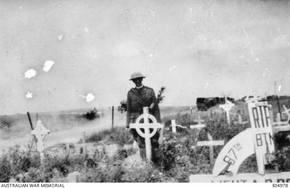SCOTT, Walter John Baliol
| Service Numbers: | Not yet discovered |
|---|---|
| Enlisted: | Not yet discovered |
| Last Rank: | Not yet discovered |
| Last Unit: | Australian Army Chaplains' Department |
| Born: | Harrow, England, 27 July 1875 |
| Home Town: | Strathfield, Strathfield, New South Wales |
| Schooling: | Not yet discovered |
| Occupation: | Church of England Clerk in Holy Orders |
| Died: | 1953, cause of death not yet discovered, place of death not yet discovered |
| Cemetery: | Not yet discovered |
| Memorials: |
World War 1 Service
| 2 Mar 1918: | Involvement Australian Army Chaplains' Department, --- :embarkation_roll: roll_number: '1' embarkation_place: Sydney embarkation_ship: HMAT Commonwealth embarkation_ship_number: A73 public_note: '' | |
|---|---|---|
| 2 Mar 1918: | Embarked Australian Army Chaplains' Department, HMAT Commonwealth, Sydney |
Help us honour Walter John Baliol Scott's service by contributing information, stories, and images so that they can be preserved for future generations.
Add my storyBiography contributed by Sharyn Roberts
The Rev. W. J. B. Scott.
An Interesting Letter from France.
The Brisbane "Dally Mail" published a most interesting letter just received from Canon W. J. B. Scott, who had just arrived in France among the"boys." Mr, Scott is Well-known in Central Queensland. He was one of the original members of St. Andrew's Bush Brotherhood, and did excellent service while here. He was subsequently rector of the Anglican Church in Gladstone, and was latterly rector of St Thomas' Church at Toowong, Brisbane. A little while ago, it will be remembered, Mr. Scott conducted a Mission in Barcaldine. This most earnest and devout worker writes from the Australian Church of England hut in France, which is supported by the C.E. fund tor Australian soldiers overseas, and he tells an absorbing story of his trip across the English Channel, and his arrival amongst the troops. He writes: "It took over 15 hours crossing from Southhampton. The boat was crowded with horses and mules, with American, Canadian, and English troops, officers of all descriptions, motor lorries and attendants, anti-aircraft guns with their teams, Japanese sailors and stewards -a mutely crowd indeed. There was no hope ofsecuring a bunk. I made friends with an English officer, and we camped beside each other on deck, with life belts for mattress. It became very cold after midnight, and what with the hardness of the bed, and the cold, sleep took a lot of wooing.
At about 2 a.m., to my joy, we discovered that a Japanese steward was selling cups of cocoa at 3d. per cup. We obtained one each, and finding some boxes to sit on, we sat nodding until dawn. At 6.30 a.m. we obtained an apology for breakfast at 2/- each.The sea was as calm as a pond, and there was more danger accordingly. The boat was fitted with a special contrivance for cutting mines. When lowered beneath the surface it looked rather like a torpedo.
We reached land about noon, and were ordered to report at camp, about seven miles out, by 3 p.m. I went to the Officers' Club, where I obtained a welcome brush-up, shave and lunch, but was feeling rather a wreck owing to a cold. Four of us then shared a taxi to the camp, but at arrival I discovered, to my dismay,that I had another one and a-half mile to tramp to the convalescent camp. There I was Introduced to the colonel, and to the Baptist padre, and had tea with them.
I have been given a canvas hut to live in. The furniture consists of a trestle table, a bed contrived with boards resting on boxes, and a bag of lumpy straw for mattress, two straw bolsters, some blankets, a tin dish on a box, and a bucket beside it. Canon Cue, the padre with whom I am to work, is a dear, lovable man, and I think it a great privilege to be with him. He has been here over two years, and is suffering from over work and nerve strain. I can hardly tell you how wonderful this place is as a spiritual centre. Never did I imagine I could find anything half so splendid in France. It is like a continual mission.
There is a daily celebration of communion. I celebrated on Wednesday, with 17 men communicants. There Is a daily choral even song, with an address, at which there is always a good congregation. Since I have been here we have started an intercession service at 11.30 a.m. daily. A padre must be on duty all day in the vestry, seeing men most of the time. Then as men go up to the firing line, an almost daily occurrence, they come in to be blessed, and often to receive communion. The Blessed Sacrament is reserved for that purpose. We give them a little cross to wear, and a pocket Testament. We also commend them to the padre at the front, and write to their people. At present I have seven men preparing for confirmation, and they are very keen. Tehell, of New Guinea, Is here. He is a sergeant, and is invaluable."
The Western Champion and General Advertiser for the Central
Western Districts Saturday 31 August 1918 page 14











